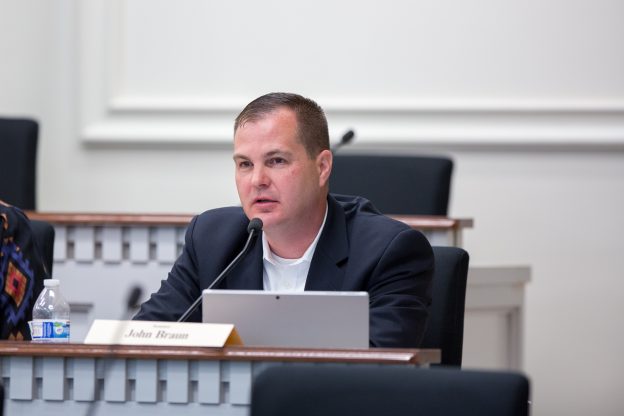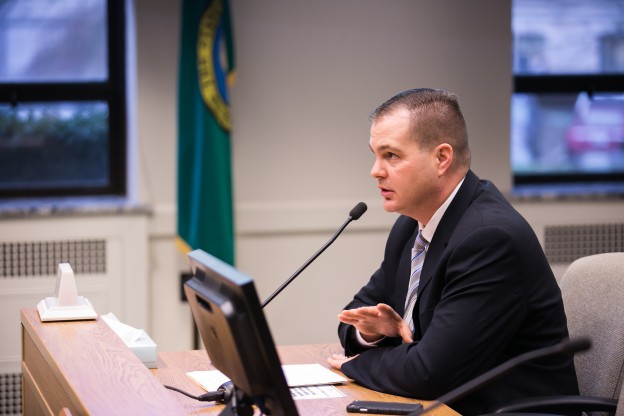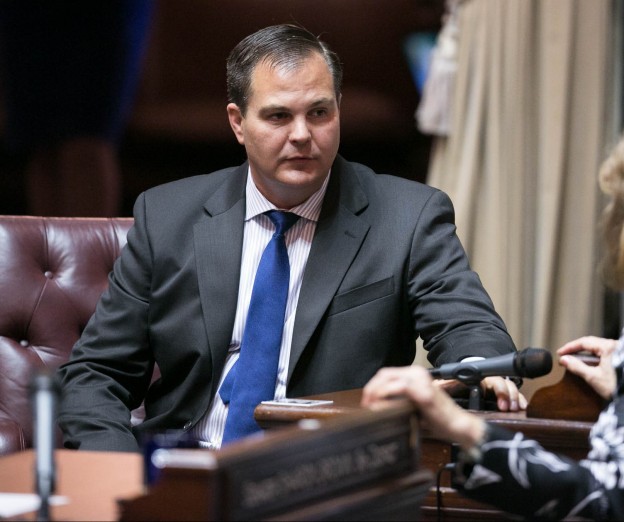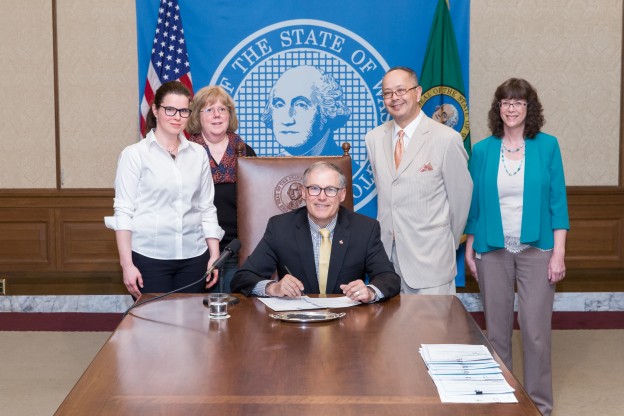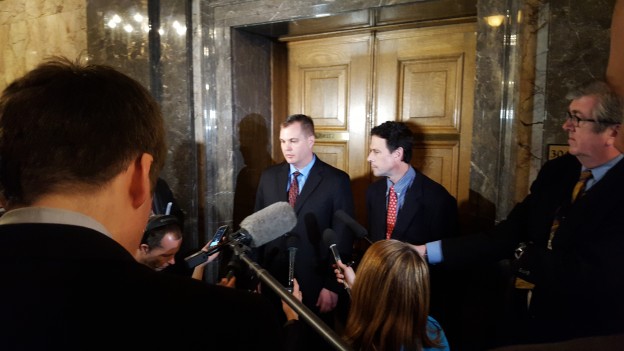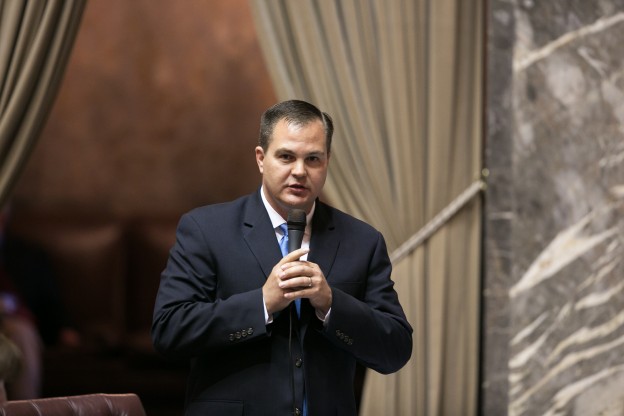
 |
 Bottom Line: Up FrontVery Expensive & Unusual – The Governor negotiated Collective Bargaining Agreements for 2017-19 that are double the cost of any prior agreements. The result is nearly half of the state’s workforce receiving pay increases of more than 10% over the next two years. Unnecessary? – Reports from the Governor’s own budget office show that Washington does a good job retaining employees. The turnover rate is well-below the national public sector average. Huge Opportunity Cost – Budgeting is about priorities. For approximately half the cost of the CBAs, inroads on significant public policy issues could be made… Please click here to read the entire newsletter. 
John Braun, 20th District State Senator  Contact Me:Email:John.Braun@leg.wa.gov Olympia Office: 407 Legislative Building PO Box 40420 Olympia, WA 98504-0420 Phone:(360) 786-7638 Website: SenatorJohnBraun.org  Share my E-newsletterDo you know others who live in our district who may not be receiving my e-news updates? Please feel free to forward this e-mail to them or click on the share button below. If you haven’t already, please subscribe to continue receiving my e-newsletter updates. Click here to subscribe! |

|
Author Archives: Laudan
In advance of the Governor’s budget submittal due in December, Sen. John Braun, R-Centralia, sent the attached letter to the director of the Office of Financial Management. The letter seeks to ensure that recent collective bargaining agreements (CBAs),that were conducted in secret, are financially feasible as required by law.
The cost of the CBAs total over $700 million from the state’s general fund in the next two years and more than $1.7 billion over the next four.
Braun points out “indefensible” budget decisions from the previous budget cycles collective bargaining agreements that:
- Reduced nursing home payments by over $100 million;
- Eliminated funding for “Safe Babies, Safe Moms”;
- Reduced breast, cervical and colon cancer screenings for low-income individuals by 15 percent;
And much more…
Read the full letter here.
Closed-door negotiations began last week on state-worker contracts for the 2017-19 biennium, and Sen. John Braun hopes it is the last time the talks will be kept out of public view.
“Washington does a better job than most states when it comes to open government,” said Braun, R-Centralia. “However, the exemption of state-employee collective bargaining from the Open Public Meetings Act is something that needs to be changed. The last time these contracts were negotiated it resulted in a 300-million-dollar commitment from taxpayers without their input.”
Braun was the sponsor of this year’s Senate Bill 5329, which would require collective-bargaining meetings to be open to the public. Braun noted the secret talks are getting under way during the week when most people seeking statewide public office later this year are filing as candidates. The governor’s office will be among those on the ballot.
“The timing is probably a coincidence, but it serves as a reminder that the governor’s people are negotiating behind closed doors with organizations that not only represent state workers but also have political agendas as well,” he said.
“Other states are successfully engaging the public in these decisions and I don’t see why Washington shouldn’t do the same,” said Braun. “Our current system does not allow for any deviation from the commitments made in secret between the governor and public-employee unions. The Legislature can only approve or reject the agreements. That wasn’t the case before 2004 and if the people’s representatives are unable to give input on the contracts, we should at least have transparency in the process.”

 |
||
Greetings Friends and Neighbors,The Legislature finally adjourned after a 20-day special session to conclude work on the state’s supplemental budget. As the lead budget negotiator in the Senate this year, I worked to ensure a sustainable and responsible budget that would allow us to live within our means. I believe we accomplished those goals with the budget we passed. The final agreement meets the requirements of Washington’s 4-year balanced budget law, preserves the rainy day fund, and refuses to go back to the irresponsible budgets of years past. This is in contrast to the original proposal from House Democrats that drained the state’s rainy day fund, reduced K-3 class-size spending by $500 million, and proposed news taxes to pay for new state programs. Instead, we continue our investments in K-12 education, fully fund historic tuition cuts, and improve treatment for our state’s most vulnerable including the disabled and mentally ill. We said no to higher taxes and insisted on a sustainable budget with no gimmicks. Unfortunately, some of our work was undone when Governor Inslee vetoed several cost-saving measures in the budget before signing it.The result was the loss of over $200 million in cost savings. The governor’s vetoes undercut this work and will make our job building a balanced two-year budget next year much more difficult. I firmly believe that without the influence of the Senate Majority Coalition, the future of our state would be much different. Over the past four years, we have brought needed discipline to our state’s budgeting process. We have consistently lived within our means, funded our state’s real priorities such as education and our most vulnerable, and held the line on new taxes.
 My work in the Legislature
In addition to working on the state’s budget, I had the opportunity to sponsor a number of bills aimed at improving our state and local community. Several of these bills were requests from constituents and local businesses who have already experienced benefits from this legislation such as changing the way the state provides industrial insurance for students and volunteers as well as expanding access to mental health services by allowing qualified physician assistants to deliver critical services. Click here for more information on bills that I have sponsored. I have also been developing a policy newsletter, called “Economic Sense,” that takes an in-depth look at issues facing the Legislature. Please take a moment and read highlights from the latest editions and visit my website for more information.
 Staying in TouchYou received this email report because you are a 20th Legislative District resident. Under election-related rules, Senators who are up for re-election later this year – including me – are allowed to send two e-newsletters to those who have not actively subscribed to them. If you wish to continue to receive additional updates you must subscribe. I hope you will take a moment to sign up so I may provide you with more news about your state government. Just click on the link below. Due to those restrictions this will be the last communication you will receive from my legislative office until after the 2016 elections. Click here to subscribe!It is an honor to serve as your state Senator. Please do not hesitate to reach out to my office with questions or concerns regarding your state government.
Sincerely,
John Braun, 20th District State Senator  Contact Me:Email:John.Braun@leg.wa.gov Olympia Office: 407 Legislative Building PO Box 40420 Olympia, WA 98504-0420 Phone:(360) 786-7638 Website: SenatorJohnBraun.org  Share my E-newsletterDo you know others who live in our district who may not be receiving my e-news updates? Please feel free to forward this e-mail to them or click on the share button below. If you haven’t already, please subscribe to continue receiving my e-newsletter updates. Click here to subscribe! |
||

|
Tuesday evening the Legislature approved a supplemental budget, concluding the legislative session. Sen. John Braun, R-Centralia, voted in favor of the bipartisan proposal that makes minor adjustments to the state’s two-year operating budget approved last year.
“This is a good supplemental,” lead budget negotiator Braun said. “It meets the requirements of Washington’s 4-year balanced budget law, preserves the rainy day fund, and refuses to go back to the irresponsible budgets of years past.”
This is in contrast to the original proposal from House Democrats that drained the state’s rainy day fund, cut nearly $500 million from K-3 class-size reductions and proposed news taxes to pay for new state programs.
“The final budget continues our investments in class-size reduction, fully funds historic tuition cuts, and improves treatment for our state’s most vulnerable including the disabled and mentally ill,” Braun said. “We said no to higher taxes and insisted on a sustainable budget with no gimmicks.”
The budget passed in the House of Representatives 78-17 and 27-17 in the Senate.
Budget documents are available online, here.
Gov. Jay Inslee today signed Senate Bill 6293, sponsored by Sen. John Braun. The new law, which won unanimous legislative approval, will allow businesses to offer industrial insurance to unpaid interns and student volunteers.
“This legislation will help expand opportunities for students to gain valuable experience in the workforce,” said Braun, R-Centralia. “Employers now have options to take on student interns, where previously they could not afford the risk of injury on the job.”
Currently, businesses may choose to cover volunteers or interns who are in high school, but they are not allowed to cover any college student who is unpaid. Braun’s legislation expands coverage to student volunteers enrolled and participating in a program authorized by any public or private school, including institutions of higher education.
Centralia College educators in the new Bachelor of Applied Science in Applied Management (BASM) program were instrumental in the passage of the legislation. Students in this program are required to participate in an internship for graduation.
Brian Cummings, the internship instructor, and Larry McGee, the original program director, recognized that allowing businesses to cover these students is critical to the program. “So much has changed in our state in the last 10 years to enhance educational pathways for our students,” said McGee. “We want nothing to inhibit the provision of high quality internships.”
Budget leaders from the Washington State Senate and House of Representatives today announced they have reached agreement on an update of the state’s current two-year operating budget. Work on a supplement to the 2015-17 budget has been under way since the 2016 regular legislative session gave way to a special session March 10. The updated spending plan includes adjustments that will pay for the costs of fighting the 2015 wildfires and increased funding for mental health care, while complying with the state’s four-year balanced-budget requirement.
“Last year we found broad bipartisan agreement on a sustainable two-year budget that made historic investments in K-12 education and reduced college tuition, while living within the means provided by taxpayers,” said Sen. John Braun, R-Centralia, who serves as vice chair of the Senate Ways and Means Committee and is a lead budget negotiator. “This year’s budget update builds upon those investments and addresses the needs of Washington residents, including significant improvements in mental health treatment and care for some of our most vulnerable citizens.”
Lawmakers are expected to vote on the bipartisan agreement Tuesday.
“Every legislative session is an opportunity to do something to improve the lives of Washington’s seven million residents,” said Rep. Hans Dunshee, D-Snohomish, chair of the House Appropriations Committee. “It took a little longer than I had hoped, but this budget was worth the wait. The Legislature will make key investments that address the teacher shortage crisis, improve mental health services, reduce homelessness, and improve the lives of foster kids. It’s not everything we wanted, of course, but that’s the reality of a divided government. The only path forward is through compromise and that’s what we’ve done with this budget agreement.”
Final budget details will be available online at leap.leg.wa.gov by Tuesday morning.
Senate budget leaders Sens. Andy Hill and John Braun released an updated 2016 supplemental budget proposal today, which will receive a public hearing in the Senate Ways and Means Committee at 2 p.m. The new plan comes at the beginning of a special session as lawmakers continue work to find bipartisan agreement on an update to the state’s two-year budget adopted in 2015.
“Recognizing we’re in divided government the Senate will continue working with our House colleagues to find common ground, while addressing the needs and priorities of Washington residents,” said Braun, R-Centralia, vice chair of the Senate Ways and Means Committee. “We’ve demonstrated we can address emergencies like last year’s wildfires and improve mental health treatment and care, while maintaining a sustainable spending plan that complies with our four-year balanced budget.”
The Senate’s updated plan increases overall state spending by $177 million over the original $38 billion budget covering 2015 through 2017. Main changes included to find common ground include utilizing the state’s “rainy day fund” to pay for $190 million in wildfire costs. The update also removes a previous difference with the House over a pension merger proposal that would have saved taxpayers and school districts money while still paying for constitutionally protected benefits.
“Our updated proposal remains a true supplemental budget following historic investments in K-12 education and tuition cuts last year,” said Hill, of Redmond, chair of the Senate Ways and Means Committee. “Part of creating a responsible budget means avoiding gimmicks that artificially balance in the near term, while creating significant problems in the future.”
The supplemental budget proposal will receive a public hearing in the Senate Ways and Means Committee today at 2 p.m.; it may be viewed online at www.TVW.org.
Today the state Senate approved legislation introduced by Sen. John Braun, R-Centralia to limit the power of state agencies by changing the way they make rules. Senate Bill 6396 would require proposed rules to be submitted to the state attorney general’s office for an opinion on their constitutionality. In addition, any new rule would automatically expire after a year unless the Legislature acts to extend it. The measure was approved by a vote of 26 to 23 and now moves to the House of Representatives for consideration.
“The problem with the flood of agency rulemaking is a lack of transparency and accountability,” said Braun. “State agencies have created 6,100 new pages rules and regulations over the past 10 years that have the force and effect of law, often with minimal public input or transparency. Laws are meant to be made by the Legislature; putting that power in the hands of unelected bureaucrats is a detriment to our state’s democracy.”
The Washington Administrative Code contains 22,000 pages of agency rules and has increased by 38 percent in the past decade. Although state agencies are granted rulemaking authority by law, Braun’s legislation would make it clear that an agency also must show it has the authority to propose a particular rule.
“This is a reasonable approach to restore accountability in lawmaking to the citizens’ elected representatives,” Braun said. “Currently, too many rules are made by agencies citing their general purpose rather than a clear delegation of authority by the Legislature. If agencies know that we will be reviewing those rules, it will give them pause to reflect on exactly what legal grounds they are making the rule. The simple fact is that rulemaking lacks the transparency and public input of the legislative process. As representatives of the people, we should not be handing that function of government over to the Executive Branch.”
Braun’s bill is modeled after practices in Colorado where any new rule adopted or amended expires after one year unless the Legislature renews the rule via legislation.












